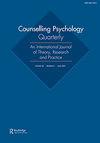治疗师在理论方向上的不诚实
IF 1.5
Q3 PSYCHOLOGY, APPLIED
引用次数: 0
摘要
本文章由计算机程序翻译,如有差异,请以英文原文为准。
Therapist dishonesty across theoretical orientations
ABSTRACT To examine whether and how therapy orientation is associated with psychotherapists’ perceived reasons for, feelings about, and regrets around their own dishonesty in therapy. A sample of 255 psychodynamic (n= 81), cognitive-behavior (n= 92), integrative (n= 64), and humanistic (n= 18) therapists who reported having been “less than completely honest” to a client provided open-text responses regarding this occurrence. A bricoleur approach was used to identify themes among responses, and Fisher’s exact test analyses were used to compare responses across theoretical orientations. The most frequent reason offered for instances of less than complete honesty was “treatment strategy” (i.e. it was deemed necessary for treatment). The most common feeling reported was discomfort, including anxiety. Most respondents reported that, in retrospect, they would not have handled the situation differently. Therapist orientation was not significantly associated to any pattern of responses to these questions. While therapist dishonesty is perceived as occurring primarily in the service of the client and tends to evoke similar reactions among therapists across theoretical orientations, most therapists report experiencing negative feelings after acting somewhat dishonestly. Training programs should encourage greater discussion about the potential benefits and consequences of therapeutic dishonesty, including instances of therapeutic tact.
求助全文
通过发布文献求助,成功后即可免费获取论文全文。
去求助
来源期刊

Counselling Psychology Quarterly
PSYCHOLOGY, APPLIED-
CiteScore
6.20
自引率
6.70%
发文量
30
期刊介绍:
Counselling Psychology Quarterly is an international interdisciplinary journal, reporting on practice, research and theory. The journal is particularly keen to encourage and publish papers which will be of immediate practical relevance to counselling, clinical, occupational, health and medical psychologists throughout the world. Original, independently refereed contributions will be included on practice, research and theory - and especially articles which integrate these three areas - from whatever methodological or theoretical standpoint. The journal will also include international peer review commentaries on major issues.
 求助内容:
求助内容: 应助结果提醒方式:
应助结果提醒方式:


